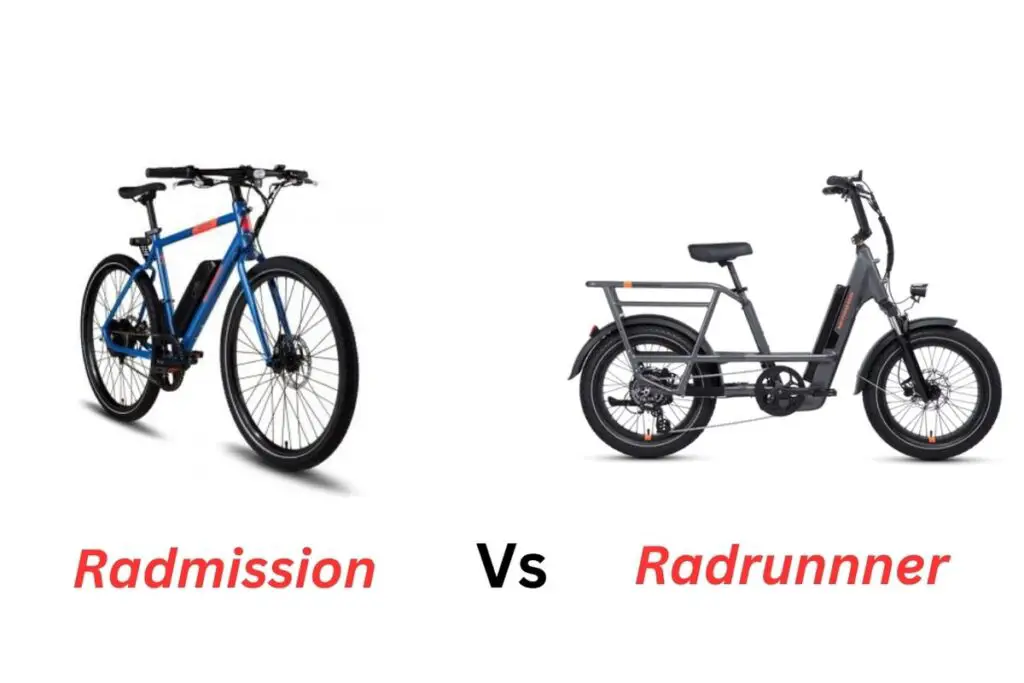
Electric bikes have gained significant popularity as an alternative mode of transportation, offering a greener and more efficient way to commute in urban areas. Among the various electric bike models available in the market, the Radmission and Radrunner stand out as popular choices. In this blog post, we will compare and contrast these two models to help you make an informed decision.
| Aspect | Radmission | Radrunner |
|---|---|---|
| Design | Sleek and contemporary design | Utilitarian design with cargo-carrying capabilities |
| Aesthetics | Stylish and modern look | Practical and versatile appearance |
| Price Range | Typically $1,000 to $1,500 | Starts around $1,500 and can go up to $2,300 or more |
| Motor Power | 500-watt geared hub motor | 750-watt geared hub motor |
| Top Speed | Up to 20 mph | Up to 25 mph |
| Acceleration | Smooth and responsive | Faster acceleration for quick bursts and inclines |
| Handling | Nimble and agile, optimized for urban maneuverability | Good maneuverability despite cargo-carrying capabilities |
| Cargo Capacity | Limited cargo space | Ample cargo space with front-mounted platform |
| Customization Options | Range of attractive colors, accessory options available | Option to add baskets, panniers, and other accessories |
| Durability | Built to withstand daily use | Robust frame for heavy-duty tasks and loads |
| Riding Range | Varies based on factors such as terrain and rider weight | Varies based on factors such as terrain and rider weight |
| Pedal-Assist Levels | Multiple levels for customizable assistance | Multiple levels for customizable assistance |
| Value for Money | Affordable with good value for money | Higher price but offers additional features and utility |
Radmission
The Radmission e-bike is a stylish and versatile option designed for daily commuting. It features a sleek frame and comes in a range of attractive colors. With its affordable price point and impressive performance, the Radmission has gained a reputation as a reliable choice for urban dwellers seeking a reliable mode of transportation.
Radrunner
On the other hand, the Radrunner is another popular electric bike model that offers a unique blend of utility and style. It boasts a sturdy frame and a range of practical features that make it suitable for a wide range of tasks, from carrying groceries to running errands. With its powerful motor and cargo-carrying capacity, the Radrunner has become a preferred choice for individuals looking for a versatile and adaptable e-bike.
Below we will delve into various aspects of the Radmission and Radrunner to provide a comprehensive comparison. We will explore their design, performance, pricing, battery range, user experience, and more.
Read Also: How to Reduce The Weight of an E-Bike?
Design Comparison
When it comes to design, both the Radmission and Radrunner showcase distinct aesthetics and features.
| Design Aspect | Radmission | Radrunner |
|---|---|---|
| Frame | Sleek, modern design with clean lines | Sturdy frame with cargo-carrying capacity |
| Aesthetics | Stylish and contemporary appearance | Utilitarian design with emphasis on functionality |
| Cargo Capacity | Limited cargo space | Ample cargo space with front-mounted platform |
| Customization | Range of attractive colors | Option to add baskets, panniers, and other accessories |
| Maneuverability | Nimble and agile handling | Good maneuverability despite cargo-carrying capacity |
| Durability | Durable construction for daily use | Robust frame for heavy-duty tasks and loads |
Radmission
The Radmission boasts a sleek and modern design, with clean lines and a minimalist approach. Its frame geometry is optimized for urban commuting, providing a comfortable riding position while maintaining an overall compact and agile feel. The Radmission is available in a range of attractive colors, allowing riders to choose a style that suits their preferences.
Radrunner
The Radrunner is designed with utility and versatility in mind. It features a sturdy frame that can handle heavy loads and accommodate various accessories. The Radrunner’s front-mounted platform offers ample space for cargo, and the optional accessories such as baskets and panniers further enhance its functionality. While it may not have the same streamlined appearance as the Radmission, the Radrunner’s design showcases its practicality and adaptability.
Overall Aesthetics
In terms of overall aesthetics, it ultimately comes down to personal preference. The Radmission’s sleek and contemporary design may appeal to riders who prioritize a stylish and modern look. On the other hand, the Radrunner’s utilitarian design caters to those seeking a practical and versatile e-bike that can handle a wide range of tasks.
It’s worth noting that both models feature durable construction and quality components, ensuring long-lasting performance. The Radmission and Radrunner are built to withstand the demands of daily use and offer a comfortable and reliable riding experience.
Read Also: Heybike Mars vs. Lectric XP: An In-Depth Comparison
Performance Comparison
When comparing the performance of the Radmission and Radrunner, several factors come into play, including speed, acceleration, and handling.
| Performance Aspect | Radmission | Radrunner |
|---|---|---|
| Speed | Up to 20 mph | Up to 25 mph |
| Acceleration | Smooth and responsive acceleration | Faster acceleration, ideal for quick bursts and inclines |
| Handling | Nimble and agile, optimized for urban maneuverability | Good maneuverability despite cargo-carrying capabilities |
| Pedal-Assist Levels | Multiple levels for customizable assistance | Multiple levels for customizable assistance |
| Range | Varies based on factors such as terrain and rider weight | Varies based on factors such as terrain and rider weight |
| Power | 500-watt geared hub motor | 750-watt geared hub motor |
Speed
In terms of speed, both the Radmission and Radrunner offer impressive performance. The Radmission, equipped with a 500-watt geared hub motor, can reach speeds of up to 20 mph, allowing riders to navigate through city streets with ease. The Radrunner, on the other hand, features a more powerful 750-watt geared hub motor, providing additional acceleration and a higher top speed of up to 25 mph. These speeds are ideal for urban commuting, enabling riders to keep up with traffic and complete their journeys efficiently.
Acceleration
Acceleration is another crucial aspect of an electric bike’s performance. The Radmission offers smooth and responsive acceleration, allowing riders to quickly get up to speed when starting from a standstill or navigating intersections. The Radrunner’s more powerful motor delivers even faster acceleration, making it well-suited for riders who require quick bursts of speed or need to tackle steep inclines with ease.
Handling
Handling is an essential consideration for any electric bike, particularly in urban environments where maneuverability is crucial. The Radmission features a nimble and agile handling, thanks to its optimized frame geometry and responsive braking system. This allows riders to confidently navigate through crowded streets and make sharp turns when needed. The Radrunner, although slightly bulkier due to its cargo-carrying capacity, maintains good maneuverability, ensuring riders can easily negotiate tight spaces or weave through traffic.
It’s important to note that both the Radmission and Radrunner offer multiple pedal-assist levels, allowing riders to choose their desired level of assistance based on their preferences and riding conditions. This flexibility caters to a wide range of fitness levels and terrain variations, ensuring a comfortable and customized riding experience for each rider.
Price Comparison
When considering the purchase of an electric bike, price is often a significant factor. Let’s compare the pricing of the Radmission and Radrunner to help you make an informed decision.
The Radmission is known for its affordability and excellent value for money. With a competitive price point, it offers an accessible entry into the world of electric bikes without compromising on quality. The exact price may vary depending on optional accessories and customization, but generally, the Radmission falls within the range of $1,000 to $1,500, making it an attractive choice for budget-conscious riders.
On the other hand, the Radrunner comes at a slightly higher price due to its additional features and cargo-carrying capabilities. The base price of the Radrunner typically starts around $1,500 and can go up to $2,300 or more depending on the chosen accessories and customization options. While it may have a higher price tag, the Radrunner offers a versatile and utility-focused design, catering to riders who prioritize cargo-carrying capacity and adaptability.
Read Also: Heybike Mars vs. Ranger: Comparing Two Exceptional E-Bike Models
When comparing the prices of the Radmission and Radrunner, it’s essential to consider the specific features, benefits, and riding needs that matter most to you. While the Radmission offers an affordable entry point into electric biking, the Radrunner justifies its higher price with its enhanced versatility and cargo-carrying capabilities.
Additionally, both models offer the option to finance your purchase, allowing you to spread the cost over a period of time if desired. This can make owning an electric bike more accessible and manageable for those who prefer monthly payments instead of a lump-sum investment.
Ultimately, the decision between the Radmission and Radrunner comes down to your specific preferences, budget, and intended use. Assess your priorities and evaluate the features and capabilities offered by each model to determine which one aligns best with your needs and budget.
Conclusion
Both the Radmission and Radrunner are impressive electric bike models that cater to different riding preferences and needs.
When considering which model to choose, it’s crucial to assess your specific requirements, budget, and intended use.
Determine whether you prioritize affordability, simplicity, and a sleek design (Radmission), or if you need a utility-focused bike with enhanced cargo-carrying capacity (Radrunner).
